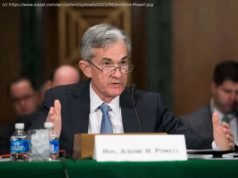Still, the International Monetary Fund urged China to resolve trade hostilities through ‘established mechanisms’
Tariffs imposed by the Trump administration on Chinese imports are likely to have “limited direct impact” on China’s economy, according to a report issued by the International Monetary Fund on Thursday.
Released just a day after Chinese President Xi Jinping warned that there would be “no winners” in a trade war during his remarks at the BRICS summit meeting in South Africa, the IMF’s annual “Article IV” consultative report offers a generally positive picture of China’s economic performance along with optimistic predictions of continuing development.
According to the 120-page document, published after IMF talks with Chinese officials in May, last year saw GDP growth of 6.9 per cent, a 0.2 per cent increase from 2016 and the first uptick in economic growth since 2010. The report also highlighted signs of success in Beijing’s efforts to change financial regulation, reduce overcapacity and combat pollution.
Yet with all eyes on the deepening trade rift with Washington, the IMF was tentative in its predictions about the economic fallout for the world’s second largest economy.
The 25 per cent tariff on US$50 billion worth of Chinese imports announced several months ago – US$34 billion of which have already been put in place – would account for just 0.4 per cent of China’s GDP, the report states. Further duties on US$200 billion in goods threatened by Trump in early July would translate to 1.7 per cent.
Although the report addresses the direct impact on China, the knock-on effects for the country harder to predict, Sonali Jain-Chandra, deputy chief of the IMF’s China team, said in a press briefing on Thursday.
“It’s too early to say at this point in time exactly how damaging [the tariffs] could be,” she said, but added that second-round repercussions could include “increased uncertainty, disruptions in supply chains, as well as increased undermining [of] consumer sentiment”.
“This could weigh on both consumption as well as investment and have a more significant macroeconomic impact,” she said.
An opinion piece published this week by China’s legal state media outlet, the People’s Court Daily, warned that the Chinese courts should ready themselves for a wave of bankruptcies as companies bear the brunt of rising export costs.
Watch: Escalating trade war affects Trump products made in China
The IMF urged China to resolve trade tensions through “established mechanisms” such as the World Trade Organisation’s Dispute Settlement Body or negotiation.
“Avoiding exceptional measures and ensuring trade actions are well-grounded in WTO rules would help reduce the risk of escalation and undermining established dispute settlement mechanism,” it said.
Beyond the realm of global trade, the Chinese government has been criticised for pursuing aggressive overseas investment projects that run counter to international development norms and risk plunging countries in debt they have no means of repaying.
As well as extensive infrastructure investment in a number of African countries, China is also pushing ahead with Xi’s signature foreign policy, the “Belt and Road Initiative”.
“Chinese investment can raise a number of red flags,” said David Bohigian, executive vice-president of the US government agency Overseas Private Investment Corporation.
Pointing to the Centre for Global Development’s recent warning that the Belt and Road Initiative had heightened debt risk in eight countries, Bohigian said China needed to adhere to global investment standards if such large-scale initiatives were to have a positive developmental impact.
Additional reporting by Associated Press.






